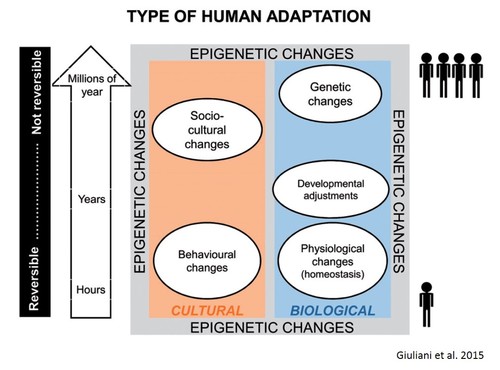Epigenetic Variability & Phenotypic Plasticity of Human Populations
PI: Cristina Giuliani

Complex interplay between the human genome and the environment is mediated by epigenetic mechanisms that create phenotypic variability at both the individual and population levels. The study of such mechanisms from an anthropological/evolutionary perspective aims at investigating the dynamics underlying the phenotypic plasticity of human populations in response to a range of (external and/or internal) environmental stimuli.
Epigenetic mechanisms, and in particular DNA methylation, are new topics of investigation in field of Evolutionary Anthropology as they can generate phenotypic diversity even in genetically identical individuals (such as monozygotic twins). Epigenetic modifications thus enable reversible adaptation to environmental stimuli at both the individual and population levels or in different ethnic groups. Therefore, genetic, epigenetic and cultural changes represent different adaptive mechanisms that act at different time scales. Since DNA methylation is a very stable epigenetic process, characterization of these modifications in ancient DNA samples allows us to investigate past gene-environment interactions. An anthropological approach to the study of DNA methylation profiles is also aimed at identifying genomic regions whose methylation levels correlate with the individual's age. This enables to pinpoint molecular markers of age and to accurate estimate chronological age of individuals from both ancient and modern samples of anthropological and/or forensic interest.
Accordingly, an interdisciplinary approach able to conjugate expertise from Anthropology, Developmental Biology, Environmental Sciences, Physiology, Medicine and Molecular Biology provides a new perspective to the study of human biodiversity and enables the description of additional mechanisms and dynamics that regulate the complex relationship between humans and their environment.
RESEARCH PROJECTS
Epigenomic variability of Gran Chaco (Argentina) Wichì and Criollos populations
Development of Martina Mastroviti's thesis: Genetic and epigenetic variability in human populations: the case of Wichì and Criollos in Argentina (A.Y. 2019/2020, Master's Degree in Biodiversity and Evolution)
Relationships between environmental contamination and epigenetic changes
UNIBO ALMAIDEA 2019 Grant: Human-environment interaction: contamination with chlorinated solvents and impact on epigenetic profiles (DNA methylation) in the Italian population

